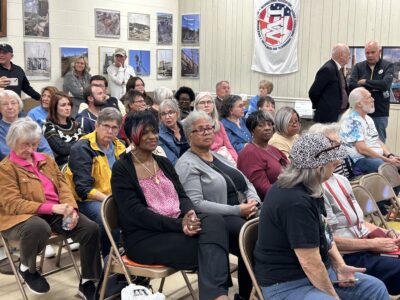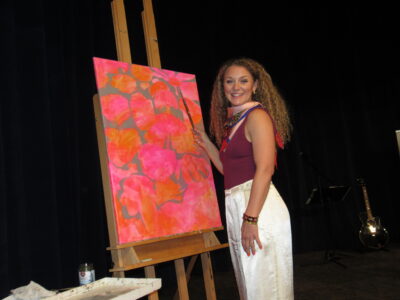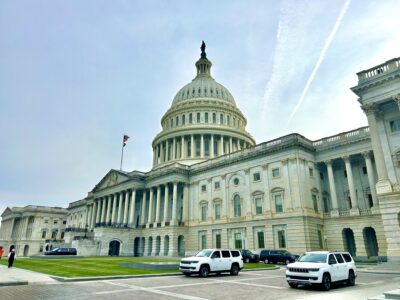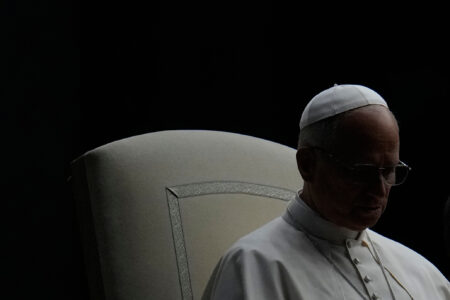Democratic Lawmakers Hear Hope Scholarship Concerns During ‘Kitchen Table Tour’ Stop in Wheeling

photo by: Joselyn King
Members of the public attend the Democratic legislators’ “Kitchen Table Tour” Thursday night at the Ironworkers Hall in Wheeling.
WHEELING — West Virginia’s Democratic lawmakers tackled questions about educational funding and the Hope Scholarship during a stop in Wheeling Thursday night.
The legislators listened to questions posed by the public during a “Kitchen Table Tour” event at the Ironworkers Hall. It was the sixth of 10 planned stops by Democratic legislators at locations throughout the state.
Democrats presently account for nine members in the 100-member House of Delegates, and two in the 34-member West Virginia Senate.
Seven of the Democratic lawmakers attended the Wheeling session. They were delegates Shawn Fluharty, D-Ohio; Anitra Hamilton and Evan Hansen, both D-Monongalia; Rick Garcia, D-Marion; and Kayla Young and Mike Pushkin, both D-Kanawaha.
Also present was State Sen. Joey Garcia, D-Marion.
The first questions of the event pertained to the Hope Scholarship, and how it could affect West Virginia’s public education funding.
Ohio County Board of Education member Andy Garber questioned why Hope Scholarship dollars were being used by West Virginia residents to attend schools in other states – often for the purpose of education in karate or dance.
“There needs to be guardrails on the Hope Scholarship,” Garber said. “School choice is something we have to deal with. Parents have a right to send them where they want to be educated.
“At the same time, if we are awarding these funds, we have to make sure it is fair.”
Garber next asked what lawmakers can do to make certain financially struggling school districts remain solvent, and if they planned to adjust the state’s school aid formula.
“There are more than 240,000 students in West Virginia,” he continued. “We need to pay attention to them – not just to the ones who want to be home schooled or go to church schools.”
Pushkin, who also serves as chairman of the West Virginia Democratic Party, noted all those at the table shared his concerns.
“The Hope Scholarship to me is based on merit. You earn a scholarship,” he said. “This is a voucher. This is meant to be an equalizer, and if they would put a cap on it I could support something like that.
“But it is meant to subsidize families who can already afford private or parochial schools.”
He acknowledged the scholarship program “is completely unregulated,” and promised that Democrats would continue to amend the bill to include caps and make certain state dollars didn’t leave the state.
Pushkin suggested the idea for the Hope Scholarship was actually an effort directed at defunding the public school system. He noted “nobody in the legislature understands the school aid formula” and that it “needs changed.”
Sen. Garcia reported that presently $120 million in state funds went toward the Hope Scholarship this year, and it is expected that number will jump to $240 million next year.
Former Delegate Mike Ferro, D-Marshall, also a former Marshall County commissioner and retired school teacher, noted Hope Scholarship funding also takes away money that could go toward shoring up the Public Employee Insurance Agency retirement fund.
He asked the Democratic lawmakers why they couldn’t do something to make the public aware that this was “a bad thing to do,” and convince the public they should take care of their retired employees.
Young said many state residents do not understand the Hope Scholarship “is sucking funding out of public schools.”
“The budget is where we show our values,” she continued. “Every dollar we are putting in to privatizing we are taking away from everybody.
“We have the money to fund childcare. We have the money to fund PEIA. We can also pass legislation like (Fluharty) proposed to legalize recreational cannabis.”
Fluharty asked, “When did public school education become the enemy in the state?”
“I’m all for public education,” he said. “I guarantee it if you ask West Virginians day-to-day if they support public education, they would say yes. The results in the Legislature don’t support that.”
Fluharty referenced the $240 million expected for Hope Scholarships in the coming year.
“Has anybody in the legislature said we don’t have the money for that? No,” he said. “But when it comes to $240 million to close the PEIA shortfall, we say there’s no money. It’s a priority issue.”





